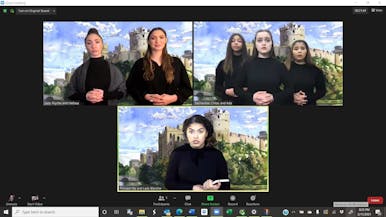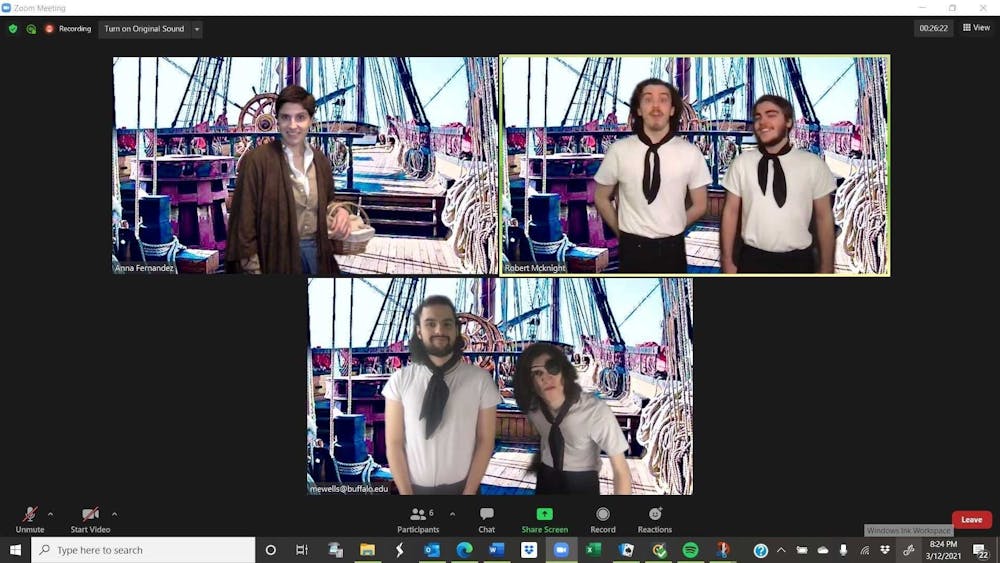Brook Leary has never performed onstage at UB.
But when Leary, a sophomore music theater major, was cast in a leading role as Princess Ida in this year’s spring musical, she saw it as something she couldn’t resist — even if the play would be produced over Zoom.
“I’ve yet to perform on the stage for a full production, so things have definitely been different than what I expected,” Leary, who partook in last year’s production of ‘Merrily We Roll Along,’ which was cancelled because of the COVID-19 pandemic, said. “I wouldn’t have expected to act in front of a camera, but I’ve been learning things this way too. I’ve been learning how to make things more subtle for camera work because you don’t need to be as huge or big as you are on stage if your face is two feet away from the camera.”
UB’s Theatre and Dance Department streamed this year’s spring semester musical, “Living in a Topsy Turvy World: The Theatre of Gilbert and Sullivan,” from March 26-28. The show is a compilation of songs and scenes from four separate comic operas — “H.M.S. Pinafore,” “Iolanthe,” “Princess Ida” and “The Gondoliers” — written by the 19th century duo of playwright W. S. Gilbert and composer Sir Arthur Sullivan. Each scene was performed twice each night: one cast, the Gilbert cast, performed one version per night and another cast, the Sullivan cast, performed the other version. Both versions have the same ensemble cast, but lead roles change to different cast members. Because of the pandemic, the show was recorded on Zoom over several sessions, with the final product being a culmination of videos from each call.
Audience members bought tickets online and then received a link via email for the live stream. Tickets cost $4 for students and seniors, $6 for the general public and $10 for group viewings.
Nathan Matthews, an associate professor and the director of musical theatre, cast students enrolled in his creative research project course. Matthews was instrumental to the musical’s launch, creating the compilation and directing the music.

Gary John La Rosa, an award winning director and choreographer, directed this show over Zoom from his home in New York City.
La Rosa said one reason he selected this show is because the pandemic has made the world “topsy turvy,” a term coined specifically from the dramatic form Gilbert and Sullivan used.
“We thought that Gilbert and Sullivan were very timely and topical because right now we are kind of living in a ‘topsy turvy’ world,” La Rosa said. “And, we thought that these scenes from these operettas had a lot of things in them that we could relate to and were surprisingly resonant. For example, ‘Princess Ida’ deals with female empowerment hundreds of years ago. In ‘H.M.S. Pinafore,’ a big section of the show deals with the class system in England, and how lower classes were treated poorly.”
Leary says she was intrigued by the show’s look at 1800s feminism and that her role as Princess Ida was different from anything she ever performed as before.
“She doesn’t want to be forced into an arranged marriage, so she decides that she wants to go to Castle Adamant where she’s going to educate women to be as strong and smart as she is because she believes that women are the superior gender,” Leary said. “So, my scene is about me trying to raise my fellow women up and let them know how strong and smart they are so that they can carry on my feminine legacy. So, she was a really interesting part to play. She’s really strong, knows what she wants, and is really intelligent. I hadn’t really played anything like that before, so I had a really good time.”
Ultimately, one of the biggest reasons “Living in a Topsy Turvy World” was created was because of the department’s tight budget. Like the rest of the university, the Department of Theatre and Dance is facing budget cuts, and while La Rosa does not know the exact numbers, he says the decreased budget contributed to many of the decisions made for this production.
Since Gilbert and Sullivan’s works are in the public domain, the department did not have to pay any royalties to perform the works themselves.
Instead of spending money and resources creating stage sets, the department bought green screens for each student, and each of the four comic operas had their own specific virtual background.
The costumes were mostly made from items regularly found in students’ closets. The sailors in “H.M.S. Pinafore” wore white t-shirts and the department only had to purchase sailor ties so everyone looked uniform. All of the extra items were ordered by the department and sent to the university; cast members had to pick them up themselves, resulting in a cast exclusively composed of students living in the Buffalo area.
“It was a bit challenging because we had a small budget to purchase some props and costume pieces, and the stuff had to be ordered. None of us had worked with green screens before, and some people were filming individually while others had up to five people filming together. So, the green screen for the five people had to be really large. We had to make sure that everybody had one and that somebody could pick it up and deliver it to people both on and off campus,” La Rosa said. “Then, the props were ordered later, and they were even more tricky because we were getting into filming but we couldn’t film until the props showed up.”
The full video was cut together in iMovie using Zoom footage and pre-recorded clips of the actors singing, in an attempt to avoid Zoom audio lag.
As part of UB’s musical theatre program, students generally have four professional guest directors over the course of their academic career, such as La Rosa. Before this production, La Rosa directed three other musical productions at UB: “The Mystery of Edwin Drood,” “Cabaret” and “American Idiot.”
La Rosa says returning to UB for his fourth production was an easy choice.
“I love working at UB because I sort of feel like family now. After four productions, I know the faculty and I know my way around campus. I really enjoy my time [at UB],” La Rosa said. “I think the department faculty is wonderful, and the quality and talent of students is really high. So, it’s an easy decision to come back and work for a period of time.”
La Rosa was originally supposed to return to campus during the fall to direct a live show, but the pandemic forced its cancelation and required La Rosa and the department to create an alternative solution. During previous productions, La Rosa lived in a Buffalo-area hotel for six weeks and commuted to campus to run rehearsals, meet with the cast and crew and supervise the production. For this production, however, La Rosa had to do everything online.
“The experience is completely different, and I miss not working with the students live because I don’t feel like I get to know them as well,” La Rosa said. “Communication is more challenging when you’re trying to do things like choreography. Also, I feel like the interaction between the students is very different on Zoom than it would be if it were live. But it was a challenge that was exciting to figure out, and I think that the students have a production to be proud of.”
Nathan Roberts, a senior music theatre major who performed as Don Alhambra del Bolero in “The Gondoliers” and Captain Corcoran in “H.M.S Pinafore,” says he also struggled with the lack of in-person interaction and Zoom filming.

“That was the really annoying part because that’s [performing alone] usually not the case,” Roberts said. “Even if you’re doing film, you’ll still have another person to work off of because you’ll be in the same room, and there will be a camera flipping back and forth between the two people. But in this situation on Zoom, you’re literally just in your room all by yourself.”
Even though La Rosa has directed over 300 productions, this particular production was a completely new experience for him because he had never directed a show over Zoom.
“Not being with the students and only seeing them on screen made me have to figure out how to budget our time again,” La Rosa said. “Also, it was made more challenging by the fact that this material requires a British accent, has very challenging music, and has archaic language. So, the whole process requires a lot of extra legwork to get it to a place where we could even begin thinking about staging it and then filming it.”
But despite the struggles of the production, La Rosa says he was happy with how everything turned out and how much everyone learned.
“I don’t think anybody really desires to work this way forever because we missed the in-person live aspect of things. On the other hand, I feel like when you had such a challenging, difficult piece of material, and worked really hard to bring it all together, you feel satisfied that you did that,” La Rosa said. “And I’m proud of what the students accomplished because a lot of the work they did, they had to do on their own as homework, which included research, musical work and dialects. Basically, they did the normal character work in a place where they could not have immediate feedback. So I think everybody learned a lot.”
Though Roberts is graduating, he is still happy with his experience at UB and is looking forward to the future.
“[Graduating like this] is certainly not the way it was expected and it does stink,” Roberts said. “There’s missed opportunities, shows, and roles that would have been on my resume that aren’t because things just aren’t happening right now. But, I’ve been very lucky to have roles earlier on at UB, so I don’t personally feel like I’ve missed out on too much. I’m happy with my experience at UB, and I’m still happy to be graduating.”
Anastasia Wilds is the senior arts editor and can be reached at anastasia.wilds@ubspectrum.com and on Twitter @AnastasiaWilds
Anastasia Wilds is the senior arts editor. She has been writing for newspapers since her junior year of high school, and she has appreciated all forms of art for even longer. When she’s not writing, she is either reading, listening to music, hanging out with her friends on discord or streaming on Twitch.





